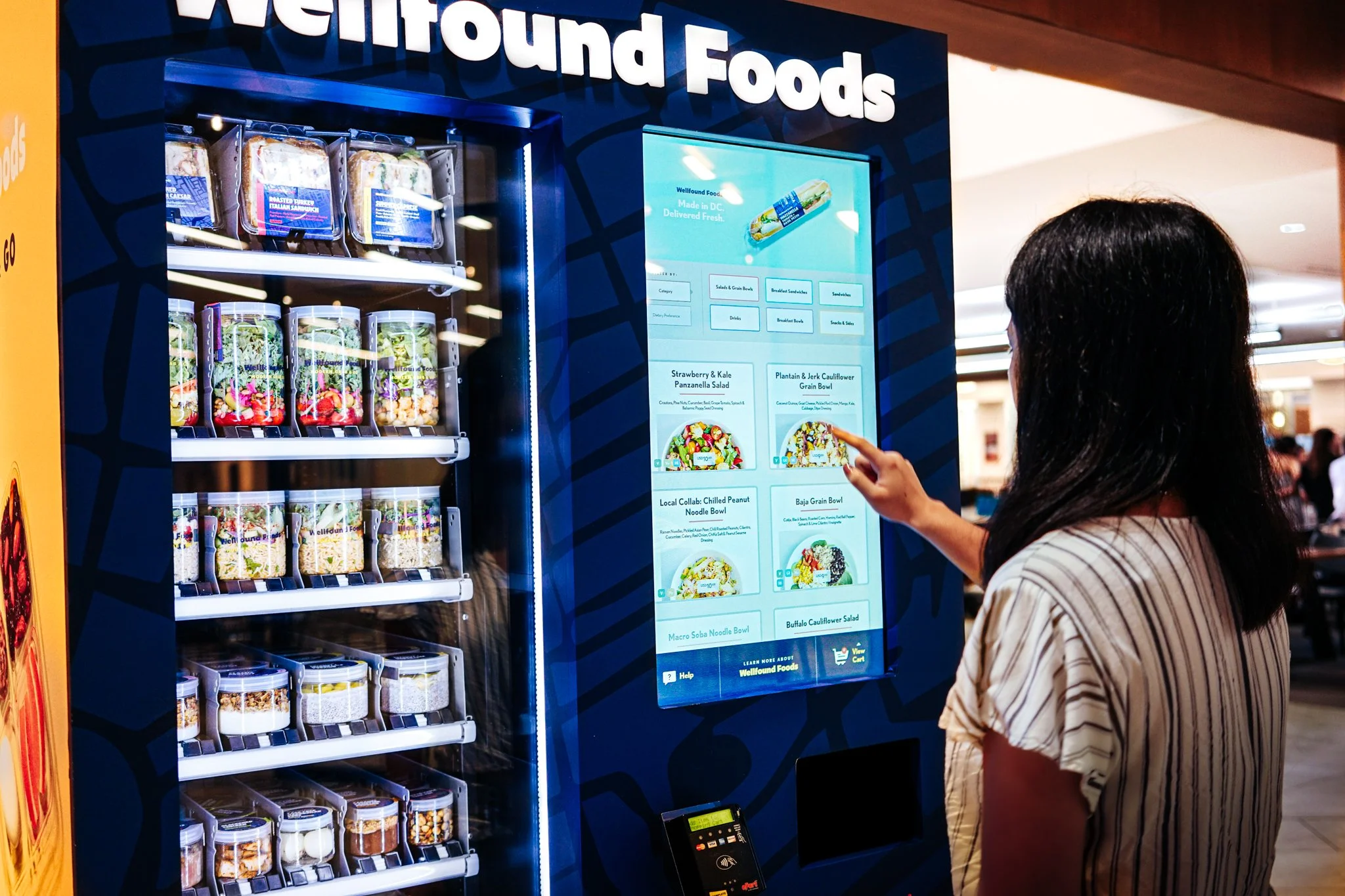WellFound Foods feeds those in need and cuts waste with help from DC grant
Photo by Maya Fiellen.
WellFound Foods sells fresh grain bowls, salads and sandwiches from 50 specialized vending machines across the Washington, D.C-Baltimore. metro area. Assisted by Food Waste Innovation Grant funding from the D.C. Department of Small and Local Business Development, the company recently started composting kitchen scraps and using newly developed tracking software to better match supply and demand—and cut waste. Between those operations and a new program to donate unsold meals, Chief Operating Officer Brian Becker said they’ve already reduced their per-machine waste from 25 to 15 percent, and expect it to continue to drop to 10 percent in the near term. RescueDish’s Rachael Jackson spoke with him about everything from the psychology of a nearly empty vending machine to strategic sandwich design.
What is WellFound Foods?
WellFound Foods is a modern grab-and-go food company. Pre-covid you could find our sandwiches, salads, grain bowls and burritos anywhere you would find a cooler, like coffee shops, universities, those types of settings. When covid hit we pivoted. Now we’re primarily focused on growing our network of SmartMarkets, which are 24/7 technologically enhanced vending machines that offer the same products but oftentimes at places and times of day you wouldn’t ordinarily find them.
When I think of prepackaged meals, I can’t help imagining soggy bread and wilting salads. How do you keep things fresh?
To start with we use only the freshest ingredients. A lot of it is food engineering as well. Our chefs and culinary team are very focused on types of breads and sandwich layering so dressings don’t contact lettuce to keep it from getting soggy.
The salads are layered upside down, engineered to be enjoyed after tipping the jar into one of the bowls we have on the side of the machine. So it plates up nice and pretty with the greens on the bottom of the bowl and then things like tomatoes, cucumbers, chickpeas, and those wetter ingredients on the top of the salad, which stayed on the bottom of the jar so they didn’t make the greens wilt.
WellFound builds its sandwiches on ciabatta bread, which the company found holds up the best over time and fits nicely into their packaging. (Photo by Maya Fiellen)
How long do items stay in the machines?
Our items have a four-day shelf life, and that’s truly a best-by as opposed to an expiration date. That allows us to donate some of the product that might be a little past its peak but certainly safe to eat and certainly still delicious.
Who are your donation partners?
We work with Miriam’s Kitchen as well as Nourish Now. They each get one drop per week right now. Their clients absolutely love it. They like that it’s portable, it’s fresh and it’s healthy.
Can you donate all the leftover meals or do you need to throw some out?
We still have some that can’t be donated. Some of it is a logistical challenge. Most of our deliveries are made overnight so if the delivery team finishes at 2 or 3 a.m., there aren’t a lot of places that can receive them. On the busier delivery nights that stretch into 8, 9, 10, 11 in the morning we can connect with donation partners. As we grow our fleet of machines every night is going to stretch that late, so we’re anticipating donating even more.
Do you compost the meals you can’t donate?
We don’t compost the finished products for a number of reasons. We would have to unwrap or unpackage each item and then compost them. From a food safety perspective, once it leaves our facility it doesn’t come back, so there’s no chance of mixing up what goes where.
WellFound Foods donates about 300 pounds of meals per week to NourishNow and Miriam’s Kitchen, who serve those in need in Washington, D.C.
Tell me about the algorithm you’re using to reduce waste.
We always kept a very close eye on what we were sending to each machine and then how much of it sold in trying to minimize waste. As our network has grown from just three machines in 2020 to now 50, that job became way too much for human brains. So, we contracted a software development company to build a proprietary algorithm, which ingests all of the data from all of the machines and provides recommendations for the next run.
The consumer psychology behind an empty vending machine is pretty interesting. In a perfect world, from a business sense, we would sell everything out the moment that the delivery team comes to replenish. In reality people are less likely to buy a premium product, particularly a fresh premium product, from a vending machine if it appears empty. Where the algorithm and our toggling comes in is how do we make this appear as abundant as possible and optimize sales and minimize waste. That’s a really, really hard thing to do, particularly in the vending space.
What have you been doing with your Food Waste Innovation Grant?
It’s been a big few months for us. We didn’t have a composting program, we didn’t have donation partners, and we didn’t have the algorithm fully propped up when the grant was awarded. The Food Waste Innovation Grant really helped us get us over the finish line. We told them we needed a donation partner and they played matchmaker.
[Editor’s note: While Wellfound is unable to compost meals pulled from machines, the company recently started composting kitchen scraps]
Tell me about your compost program.
We try to order as much as we can right on the nose, but any excess produce now gets composted. The grant funded the cans and bins, training of our culinary team, as well as several months of the compost service itself, which we plan to continue once that money is exhausted. What’s cool about Compost Cab is they allow some of the trimmings from the chicken as well as bones. We were able to compost more than we thought we could.
Have you found ways to make your single-use packaging sustainable?
Yes, with limitations. We were able to source compostable spoons and forks. As of yet the technology behind compostable plastics can’t house a salad that has wet ingredients for four days at refrigeration temperatures without disintegrating. We keep our eye on if and when that innovation is going to happen, but right now it’s not available and any of the options we’ve looked at have been extremely expensive as well. But the biggest thing is it’s not going to hold the liquid for four days, which could cause a lot of issues for us.
Are you able to source from local growers?
It’s generally cost prohibitive. And, it’s one thing to have a fine dining restaurant where you can rotate specials based on what you’re able to source. For us, the power of our brand is our ability to produce consistent, healthy, delicious food at scale. Getting one of our smoked gouda Cobb salads from any one of our fifty machines should feel and taste exactly the same.
But we are looking to update the menu a little more frequently, instead of twice a year, one per each season. It’s kind of a slow-moving ship when you have to do all the nutritional information and the labeling and the other stuff we have to do in order to provide direct to consumer.
Mark Locraft, executive chef at Wellfound Foods. He “is a wizard in many ways, but in particular with regards to waste,” said company COO Brian Becker. “He’s very conscious of using as much of the vegetable and as much of the protein as he can.”
How do you manage food safety in a vending machine?
We have a director of food safety and quality. He is able to track all of the batch codes and sourcing for each of the ingredients that go into the food. Let’s say there’s a batch of strawberries that went into the parfaits. At a click of a button, Graham can trace back to the case of strawberries and what batch they were from. We do mock recalls.
We also do constant temperature monitoring. Our delivery drivers actually have a tester item that they probe with a thermometer. They record the temperature that’s in the truck for the duration of the delivery cycle. So we know there’s full cold chain throughout and then we are able to log into any machine at any time and report the temperature. There’s a kill switch if it rises above a certain temperature for a certain amount of time.
Tell me about how you partner with local restaurants on limited edition dishes.
Chef Mark gets together with the chef and they agree on an item that is in the spirit of that restaurant but usually not offered there. Our team totally produces it and they help promote it, it’s kind of a cool way for some of the DC brands to reach a new audience.
Call Your Mother put together a super interesting collaboration in the summer. They were particular about not having their fresh bagels, which are their shining stars, put in refrigeration, because they wouldn’t taste the same. So Mark and his team made bagel chips out of their excess everything bagels, and they put together a smoked salmon and everything bagel salad. The flavor profile tasted very much like a lox sandwich. Because Call Your Mother’s brand is so strong, people reported that they tried the vending machine salad they were afraid of, much less with salmon, because they were interested.
What’s your favorite item on the menu?
The plantain jerk grain bowl. It has jerk seasoned cauliflower, plantains, mango and a coconut quinoa base. It’s delicious.
Do different items tend to do better in different markets?
Hospitals and the coconut chia mango pudding have a very special relationship. I have friends who are doctors and nurses and they say it’s the perfect 3 a.m. snack. In the airport the salads and all the breakfast items do very well, because you can’t really find anything like that there. There are lots of sandwich shops so we tend to scale back a little on the sandwiches. At the train station in Baltimore everything goes because there’s nothing else there. On the military sites, lots of protein sides, lots of burritos, lots of sandwiches, not as many salads.
What are the next steps for WellFound Foods?
To grow quickly. We are hoping to have 150 machines in the field by the end of next year.
Truly every day is exciting. These last couple years we’ve worked so hard for the moment we’re about to experience, which is that our stuff is starting to be found nearly everywhere. We want to expand to parts of DC that have traditionally not had great fresh food options. We’ve begun talking with some partners to address some of the food insecurity or food desert problems that are so prevalent in our city. We’re excited for that next chapter.
Wellfound Foods CEO and Founder, Sarah Frimpong started the company because she was frustrated with low-quality prepackaged sandwiches. Now, Wellfound sells high-end, fresh sandwiches in 50 locations and counting across the Washington-Baltimore region.
This conversation has been edited and condensed.





